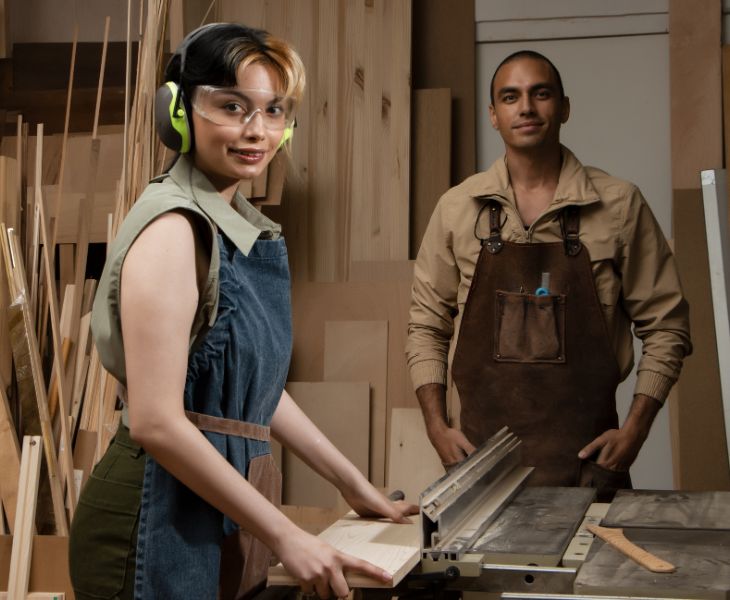Within a packed curriculum it can be hard to balance everything that students are required to master, especially with the added pressure that external testing can bring. Maths, English, and Science obviously get high priority, but what about other areas that fall out of this narrow academic focus?
Hands-on, practical learning is extremely important for young children as it helps develop their motor skills. High schools offer design and technology, hospitality, and work studies classes to teach students practical skills but they are offered as electives. There is a huge amount of research showing the benefits of practical learning, from creating an improved skills set to fostering better knowledge retention. Should we be considering a wider integration of practical skills education?
Eliminating the stigma of learning practical skills
Even as degrees have become more expensive, there is a continued push to get more young people into higher education, with a range of scholarships available to encourage wider participation. It is not uncommon to see studies referenced by the government or the media stating that university graduates have faster salary growth than those who only finished year 12.
According to an article by NPR, Generation Z (born between 1997 and 2012) are the most educated generation to date in terms of school attainment and qualifications. As a consequence, getting into many courses has become a lot more competitive. The competition to get into university has meant that students wanting higher education tend to favour core rote learning subjects over practical skill electives.
Stigma placed on practical skills classes may also deter students from taking them. Practical classes are sometimes seen as the domain of students failing academically and will likely go into “unglamourous” trades. The underinvestment in TAFE over the last ten years shows the stigma against trades may affect the government as well.
Trade shortage
As a result of the focus on strictly academic subjects, Australia is now suffering a trade shortage. An SBS article drawing on 2022 data from the National Skills Commission, compiled a list of the 20 most in-demand jobs. Positions that demand practical skills, such as motor mechanics, metal fitters, electricians, and cooks all feature heavily.
Benefits of learning practical skills in the classroom
Education can be delineated into three broad spheres: head (cognitive), hand (practical), and heart (social). In an article for the magazine Teachwire, writer Gareth Sturdy argues that excessive emphasis on the head in school has come at the expense of the hand and heart. This emphasis can disadvantage students and exacerbate status rifts between them.
The theory also acknowledges the artificial pressure to choose EITHER practical OR theoretical learning. In reality, anyone can benefit from a mix of both. There should be no need for all subjects to define a future career path. Learning practical skills demonstrates some clear and direct benefits, as well as more subtle benefits that may become apparent over time. These benefits include:
Encouraging self-sufficiency in real-life situations
Cooking, assembling items and performing repairs are all real-life skills that anyone can benefit from learning. Being self-sufficient can save you money. time, cut down on waste and can make you feel good to boot!
Promoting cross-curriculum teaching and learning
Due to the subjects and skills that students are expected to master , cross-curricular teaching may help students learn and retain information. Cross-curriculum teaching involves bringing elements of different subjects together in one lesson. The teaching of practical skills presents a chance to mesh theoretical and hands-on learning.
Opening different career paths
Gareth Sturdy’s Teachwire article also shines a light on a changing view of professions in 2023.
“Several generations and a global pandemic later…the wider culture is now waking up to the importance of practical knowledge, and belatedly realising that the smooth running of society rests at least as much on tradespeople as it does on office drones typing on computers.”
Diminishing returns from tertiary institutions and a skill shortage has forced employers to make trades more attractive. Add to that a post-pandemic appreciation of the value of essential workers and there is a stromg case for upskilling students to give them more flexibility and choice in a fast-changing job market.
Putting us in touch with the world
A recent Current Affairs magazine article details how an appreciation of the natural world and society around us is linked to our participation in it. Just as growing up in a big city can blunt our feelings of connection to the outback, engaging in only theoretical learning can distance us from our immediate surroundings.
The author sees classes such as Design and Technology as helpful but goes even further to suggest students receive instruction in animal care and plant identification to foster a sense of awareness and responsibility within the wider world.
Improving mental health
A 2019 article in Psychology Today examined working with one’s hands, and how doing so can have profound psychological effects, such as:
- Providing time to engage in an activity that isn’t as cognitively demanding as theoretical work. This can give the brain time to rest or even work on problems subconsciously.
- Humans are made to be active, and employing practical skills allows us to satisfy our need for physical activity.
- A sense of well-being comes from formulating a task and then realising it in physical form. Making things gives us a sense of control over our environment and activates our brain’s reward centre.
Employing practical skills in education
Should all students put a premium on learning trade skills at the expense of other theoretical knowledge? Definitely not, but with the number of benefits that can come from learning about and employing practical skills, it’s worth considering (re)integrating them into the mainstream classroom. Promoting greater self-sufficiency, deeper cross-curriculum learning, and helping to break down the hard barrier between those who go to university and those who don’t is a win for everybody.
If you’re a teacher looking for resources for your classroom, check out COS’ wide range of supplies, suitable for many hands-on activities. For more information, and to see what solutions we can offer you, contact our Customer Service team on 1300 79 27 85 or email education@cos.net.au.

